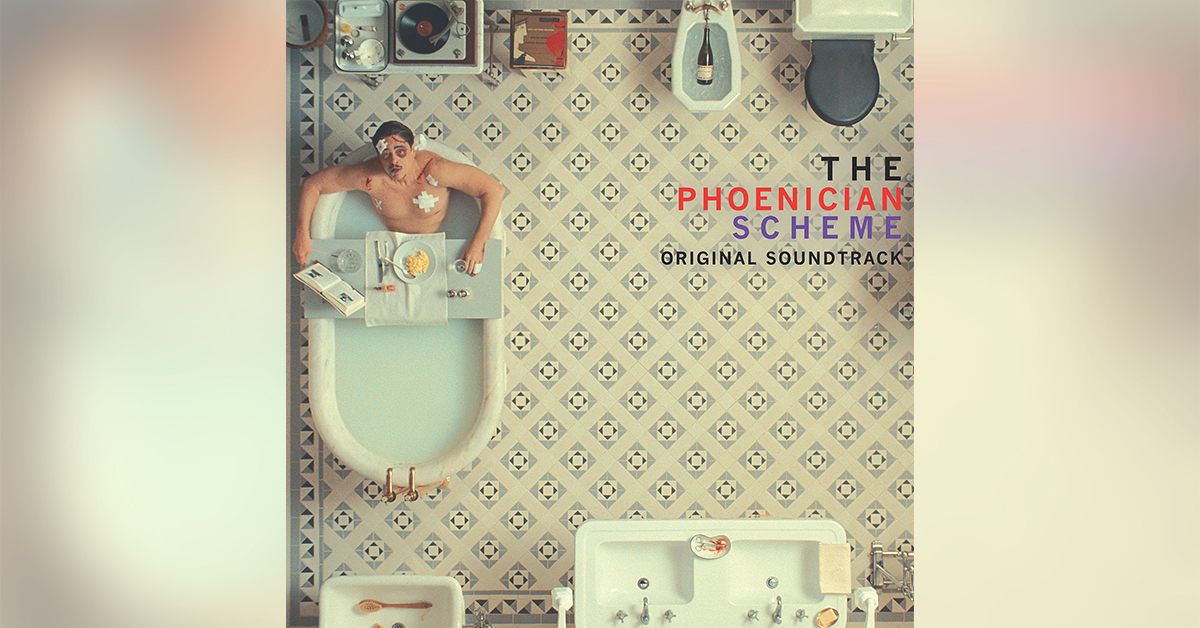
Soundtrack Features Works of Gene Krupa, Glenn Miller, Igor Stravinsky + Original Score By Alexandre Desplat
The Phoenician Scheme (Original Soundtrack) has been released on all digital platforms. The music for Wes Anderson’s latest film includes works by composers spanning centuries, including Bach, Beethoven, Mussorgsky, Stravinsky, big band greats Glenn Miller and Gene Krupa, and Academy Award® winner Alexandre Desplat, among others. The vinyl version can be pre-ordered now and will be released July 11.
Today marks the limited theatrical release of The Phoenician Scheme, which premiered earlier this month at the Cannes Film Festival and will see a wider June 6 release. The film follows enigmatic industrialist Anatole “Zsa-zsa” Korda (Benicio del Toro) as he narrowly escapes assassination attempts and appoints his own 20-year-old daughter Liesl (a nun played by Mia Threapleton) as his successor in business. The ensemble cast also includes Michael Cera, Riz Ahmed, Tom Hanks, Bryan Cranston, Mathieu Amalric, Richard Ayoade, Jeffrey Wright, Scarlett Johansson, Benedict Cumberbatch, Rupert Friend and Hope Davis. The story is by Anderson and Roman Coppola with screenplay written by Anderson.
The music supervisor is Randall Poster, who has worked with Anderson on every one of his films since 1998’s Rushmore, making The Phoenician Scheme the pair’s twelfth collaboration.
The film’s most dominant musical force is Russian-born composer and conductor Igor Stravinsky. His dramatic ballet scores Petrouchka and L’Oiseau de Feu (The Firebird) (taken from recordings conducted by Stravinsky himself) underpin the characters’ emotional and geographic journeys. In addition to pieces from Stravinsky’s ballets, Anderson and Poster zeroed in on the soaring final movement of Stravinsky’s Apollon musagète. “Apotheosis” plays during the opening credits sequence, a way to introduce Zsa-zsa as “epic.” “Our film is about a man who is like a mountain,” says Anderson. “He is himself of epic scale, his life is on an epic scale.”
“The opening is so layered,” says del Toro. “And I love music. It’s different, I think, from other Wes Anderson movies: more somber and orchestral.”
To accompany the score by Desplat, which masterfully weaves quotations from L’Oiseau de Feu (The Firebird) throughout the film, Poster and Anderson explored popular music from the film’s era. That included work by jazz legends Glenn Miller and Gene Krupa, whose drumming helped inspire the percussion that courses through the soundtrack.
For a standout drum solo in a key train car scene, Anderson turned to an early recording of Krupa’s “Drum Boogie” – famously performed with matchsticks alongside Barbara Stanwyck in Howard Hawks’s Ball of Fire (1941). “There’s some great drum solos in the Wes Anderson canon,” says Poster. “This one definitely joins the list.”
To bring the film’s lively cabaret scenes to life, Poster and Anderson enlisted a group of musicians from Berlin’s vibrant jazz scene. Led by Los Angeles-born multi-instrumentalist and composer Fuasi Abdul-Khaliq, and credited as the Fuasi Abdul-Khaliq Sextet, the ensemble recorded Jerry Horowitz’s “Mud Bug” specifically for the film and appears onscreen as the swing band, bringing a dynamic energy to the soundtrack.
ABKCO has had a unique working relationship with Wes Anderson, releasing the original soundtrack for every film he has written and directed for close to two decades. Following The Darjeeling Limited (2007), Anderson began his working relationship with Desplat who has since scored Fantastic Mr. Fox (2009), Moonrise Kingdom (2012), Academy Award® winning Best Original Score The Grand Budapest Hotel (2014), Isle of Dogs (2018), The French Dispatch (2021), and Asteroid City (2023). These soundtracks are all currently available from ABKCO Records.
THE PHOENICIAN SCHEME (ORIGINAL SOUNDTRACK) TRACKLIST
Side 1:
- “Airplane Crash #1” – Alexandre Desplat
- Apollon musagète: “Apotheosis” – Igor Stravinsky and RCA Victor Orchestra
- “A.Z.K. Land and Sea”– Alexandre Desplat
- “Palazzo Korda” – Alexandre Desplat
- “Piano Sonata No. 2 in A Op. 2 IV Rondo” – Robert Corben
- Petrouchka, 1947 Version: “Tableau 1, The Shrovetide Fair” – Igor Stravinsky and Columbia Symphony Orchestra
- “The Gap Explodes” – Alexandre Desplat
Side 2:
- “The Trans-Mountain Locomotive Tunnel “– Alexandre Desplat
- “Drum Boogie” – Gene Krupa & His Orchestra
- “Mud Bug” – Fuasi Abdul-Khaliq Sextet / Fuasi Abdul-Khaliq / Christian Grabandt / Rob Gutowski / Kelvin Sholar / Erik Unsworth / Eric Vaughn
- “The Jungle Unit of the Intercontinental Radical Freedom Militia Corps” – Alexandre Desplat
- “Jesus bleibet meine Freude (Chorale)” – Karl Richter, Munich Bach Choir, Münchener Bach-Orchester
- “Hach Baregel” – Ahuva Tsadok and Nachum Nardi
- “Heaven #5 (Dost Though Not Fear God)”– Alexandre Desplat
- “A String of Pearls” – Glenn Miller & His Orchestra
- “Pictures At An Exhibition: “Promenade 1” – Berliner Philharmoniker, Herbert von Karajan
- L’Oiseau de Feu (The Firebird), – “Introduction”/”Le Jardin enchanté de Kachtchei”/”Disparition du palais et des chevaliers pétrifiés, allégresse générale” – Igor Stravinsky and RCA Victor Orchestra